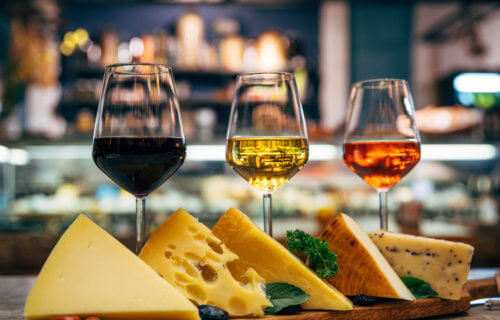
AMES, Iowa — If the sight of a cheese platter and some good wine at a party brings you sheer delight, researchers from Iowa State University have great news for you and your brain! Their study reveals this popular pairing may actually contribute to better cognitive health as you age. Researchers say this is the first large-scale report which finds that specific foods can help fight Alzheimer’s disease.
The study examined health records for nearly 1,800 adults between 46 and 77 years-old in the United Kingdom. Participants, who are all part of the biomedical database UK Biobank, completed a Fluid Intelligence Test (FIT) at the start of the study between 2006 and 2010. The group then had two follow-up assessments in 2012-13 and 2015-16. All of these tests gave researchers a snapshot of the group’s ability to “think on the fly” as they aged.
The 1,787 participants also answered questions about their food and alcohol consumption during each of these three examinations. Study authors wanted to know about a wide variety of dietary choices each person was making over the years. Participants were polled on their consumption of various foods and beverages, including: fresh fruit, dried fruit, raw vegetables, salad, cooked vegetables, oily fish, lean fish, processed meat, poultry, beef, lamb, pork, cheese, bread, cereal, tea, coffee, beer, cider, red wine, white wine, champagne, and liquor each participant consumed.
‘The right food choices can prevent Alzheimer’s and cognitive decline altogether’
The results reveal a surprising diet that may form an unlikely defense against cognitive decline later in life. Researchers discovered cheese provides the most protection against age-related cognitive issues. Its impact is significantly greater than any other food in the report.
The study also finds consuming alcohol daily, particularly red wine, can improve cognitive function as you age. While red meat continues to be a dietary concern, researchers say eating lamb weekly can increase mental prowess over the long haul.
One thing researchers find is not good for long-term brain function is excessive use of salt. They add people who are already at risk for Alzheimer’s disease are likely the only ones who need to strictly watch their salt intake.
“I was pleasantly surprised that our results suggest that responsibly eating cheese and drinking red wine daily are not just good for helping us cope with our current COVID-19 pandemic, but perhaps also dealing with an increasingly complex world that never seems to slow down,” principal investigator Auriel Willette says in a university release. “While we took into account whether this was just due to what well-off people eat and drink, randomized clinical trials are needed to determine if making easy changes in our diet could help our brains in significant ways.”
“Depending on the genetic factors you carry, some individuals seem to be more protected from the effects of Alzheimer’s, while other seem to be at greater risk. That said, I believe the right food choices can prevent the disease and cognitive decline altogether. Perhaps the silver bullet we’re looking for is upgrading how we eat. Knowing what that entails contributes to a better understanding of Alzheimer’s and putting this disease in a reverse trajectory,” neuroscience Ph.D. candidate Brandon Klinedinst adds.
The study appears in the Journal of Alzheimer’s Disease.
